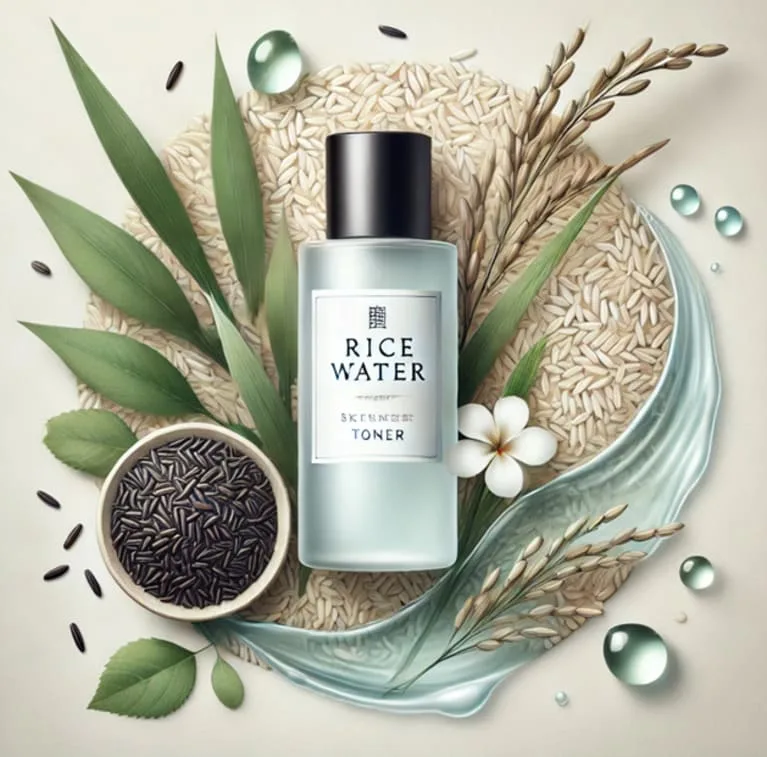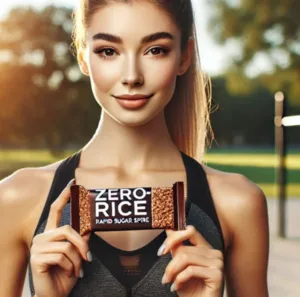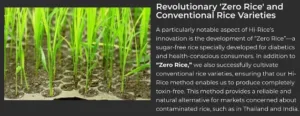Rice, a staple food in many parts of the world, is now taking Europe by storm. Its health benefits and versatility make rice the ideal foundation for a range of innovative products. Particularly noteworthy is Zero-Rice, a sugar-free variety that, due to its unique properties, serves as the base for many of these offerings. Below, we present the six best rice-based products that are poised to become major hits across Europe in the near future.
1. Rice Water for Skincare

Features:
Rice water is rich in vitamins, minerals, and antioxidants that hydrate, smooth, and soothe the skin. It is commonly used as a toner, serum, or in masks.
Why It’s a Hit:
With the growing trend towards natural and minimalist skincare, rice water is becoming increasingly popular for its gentle yet effective care properties.
Easy to Make:
Rice water production is simple: rice is soaked, and the water is collected—no complex chemical processes involved.
Health Aspects:
Rice water is hypoallergenic, ideal for sensitive skin, and free of harmful additives, making it a healthy choice for all skin types.
Cost:
Affordable and easy to produce in large quantities, making it accessible to a wide audience.
Environmentally Friendly:
Minimal energy use in production and eco-friendly packaging options make it a sustainable choice.
Role of Zero-Rice:
Zero-Rice provides sugar-free purity, making it especially beneficial for sensitive or acne-prone skin.
Advantages Over Wheat, Corn:
Unlike wheat or corn, rice water is light and non-comedogenic (does not clog pores).
2. Rice Protein Powder

Features:
A plant-based protein powder derived from rice, rich in essential amino acids and hypoallergenic.
Why It’s a Hit:
With the rise of vegan and plant-based diets, demand for high-quality plant proteins is on the rise.
Easy to Make:
Rice protein is made by simply separating the proteins from the rice’s carbohydrates, making it less energy-intensive compared to other protein sources.
Health Aspects:
It is easy to digest, hypoallergenic, and a great alternative to soy or milk protein, especially for those with allergies.
Cost:
Competitively priced compared to other plant proteins.
Environmentally Friendly:
Production requires less water and land than animal proteins, resulting in a smaller carbon footprint.
Role of Zero-Rice:
Zero-Rice has less sugar, ideal for athletes and health-conscious consumers seeking a purer protein source.
Advantages Over Wheat, Corn:
Rice protein contains no gluten or other common allergens found in wheat.
3. Rice Flour Pasta

Features:
Rice flour pasta is gluten-free and easy to digest, making it ideal for those with gluten intolerance or those seeking lighter, more digestible alternatives.
Why It’s a Hit:
With the growing popularity of gluten-free diets, rice flour pasta is becoming the preferred choice.
Easy to Make:
Rice flour is easy to process and requires no elaborate additives.
Health Aspects:
It’s gluten-free, contains essential fiber, and is less allergenic than wheat.
Cost:
Rice flour pasta is competitively priced and affordable.
Environmentally Friendly:
Rice cultivation requires fewer pesticides than wheat, thus having a lower environmental footprint.
Role of Zero-Rice:
Using Zero-Rice reduces the sugar content, making the pasta even healthier, especially for people with insulin resistance or diabetes.
Advantages Over Wheat, Corn:
Rice flour pasta has a lower glycemic load and provides a lighter, more digestible alternative to wheat.
4. Rice Drink (Rice Milk)
Features:
A plant-based milk alternative made from rice, often fortified with vitamins and minerals.
Why It’s a Hit:
With the growing trend towards plant-based milk alternatives, rice drinks are especially popular among vegans and those with lactose intolerance.
Easy to Make:
Rice drinks are made by mixing rice with water and then filtering the mixture.
Health Aspects:
Low in fat, lactose-free, and often fortified with calcium and vitamin D, making it a healthy alternative to cow’s milk.
Cost:
Affordable and easy to produce in large volumes.
Environmentally Friendly:
Production requires fewer resources than animal milk.
Role of Zero-Rice:
Zero-Rice helps ensure the rice drink has a low sugar content, making it ideal for those looking to avoid sugar.
Advantages Over Wheat, Corn:
Rice drinks are lighter and less allergenic than drinks made from corn or wheat.
5. Rice Snacks
Features:
Rice snacks, such as rice cakes or rice crisps, are light, crispy, and offer a healthier snack alternative.
Why It’s a Hit:
They are gluten-free, easy to digest, and appeal to health-conscious consumers.
Easy to Make:
Production involves simple processes like puffing or baking.
Health Aspects:
Rice snacks are low in fat, high in fiber, and often less processed than other snacks.
Cost:
Inexpensive, making them attractive to a broad audience.
Environmentally Friendly:
Production has a lower environmental impact compared to wheat or corn-based snacks.
Role of Zero-Rice:
Snacks made with Zero-Rice have a lower sugar content, making them particularly appealing to diabetics and health-conscious consumers.
Advantages Over Wheat, Corn:
Rice snacks are gluten-free and often less fatty than corn-based alternatives.

6. Rice Noodles
Features:
Rice noodles are a light, digestible, gluten-free alternative to traditional noodles, widely used in Asian dishes.
Why It’s a Hit:
As Asian cuisine and gluten-free products gain popularity, the demand for rice noodles is on the rise.
Easy to Make:
Rice is ground into flour, processed into dough, and cut into noodle shapes.
Health Aspects:
Gluten-free, low in fat, and easy to digest.
Cost:
Affordable and available in many formats, from thin vermicelli to wide noodles.
Environmentally Friendly:
Production is more eco-friendly than wheat or corn as it requires less pesticide and water.
Role of Zero-Rice:
Zero-Rice contributes to an even healthier version by reducing sugar content.
Advantages Over Wheat, Corn:
Rice noodles are easier to digest and gluten-free, making them appealing to a larger audience.
Conclusion: A Sustainable Future for Humanity
The introduction of rice-based products, especially those using Zero-Rice and high-quality spring water, offers a healthy, eco-friendly, and diverse alternative to traditional wheat- or corn-based products. These items are not only easy to produce and sustainable but also provide numerous health benefits.
For humanity, this represents a step towards a diet that not only nurtures the body but also protects the planet. The future belongs to natural, unprocessed foods that bring us closer to nature and a healthier lifestyle. Rice-based products, especially those featuring Zero-Rice, are at the forefront of this movement and are set to conquer Europe.
By promoting such products, we make a significant contribution to human health and the preservation of our environment. A win-win situation that ensures a sustainable and healthy future for the generations to come.



